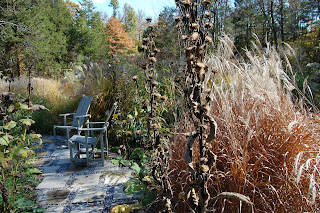James Golden's blog View from Federal Twist is one I've followed for years, but James has been a follower of mine for longer - he read my 1996 book The New Perennial Garden when no-one knew what a blog was.So it was with great interest I drove up last week from Philadelphia just over the Delaware into New Jersey.
I
feel honored when gardeners follow my ideas and I love seeing what
they do with them. The garden at Federal Twist is very much what I
have in mind when I write – a journey through lots of rambunctious
vegetation. Its the end of the season so the grasses dominate,
miscanthus varieties especially, but some Aster tartaricus
hanging on, the native asters and even ironweed having gone to seedy
silhouettes. There's a big Inula
which has self-sown a bit, and I can't help feeling I'm glad it
doesn't with me. We are surrounded by forest: tall maple, beech and
oak, and the colours are magnificent, the perfect setting for a glade
of perennial seedheads.
-->
I
wander around with James, talking about the various people in the
garden world he comes across through his blog. Strong sunlight makes
every shade of dead grass and perennial glow. I try to imagine it
with flowers, but realize that I'm not that bothered, this
late-season look is good enough for me.
These
forest glade gardens are very American. So much of people's living
space is carved out of forest – most of it secondary or tertiary
growth after being cleared in the 19th
century. Woodland here has the most remarkable powers of recovery.
There are huge problems with invasive exotic species, but I can't
help the feeling that if a property is abandoned, the forest will
just envelop it, and eventually shade out everything that doesn't
belong. Its a feeling we don't have back home. It makes Federal Twist
seem very temporary, almost a gesture against the wind, which is
perhaps how a garden should be.
James
visits every weekend, so I should imagine maintenance is pretty
light. He leaves it standing and burns it all in spring - "stand back when the Miscanthus catches fire" he warns. He's lucky
he can, as fire departments can get pretty uptight about this in many
areas, which is a pity as burning is such an effective and natural
way of getting rid of dealing with dead herbaceous vegetation and
with aggressively spreading exotics. I write this visiting another
colleague, whose garden has been overrun with something he calls
Chinese stilt grass, which is the most horrific spreader, shade
tolerant and smothers native vegetation. I am sure burning would be
the most effective way of dealing with it but he can't. I'd been to a
fantastic conference earlier in the week, organized by the
Pennsylvania Horticultural Society, where we end up listening to Neil
Diboll, of prairie nursery, whose extremely lively presentations
always end with praise for the burn as an essential annual
maintenance tool. “There are three conditions to be met regarding my place of residence” he
says, “to be able to leave my keys in the car overnight, to pee off my own deck and to burn my
prairie”.
-->
The
PHS conference is a fantastically lively event, the energy of 560
gardeners and landscape professionals is warm and positive. People
are surprised when I tell them that we don't have events like this
back home. There's piles of nursery catalogues to pick up and browse
through, and the glories of the Scott Arboretum to explore during
break-out time and afterward. Everything is very well maintained and
very well labelled, it must be a wonderful place to learn about
gardening.

























